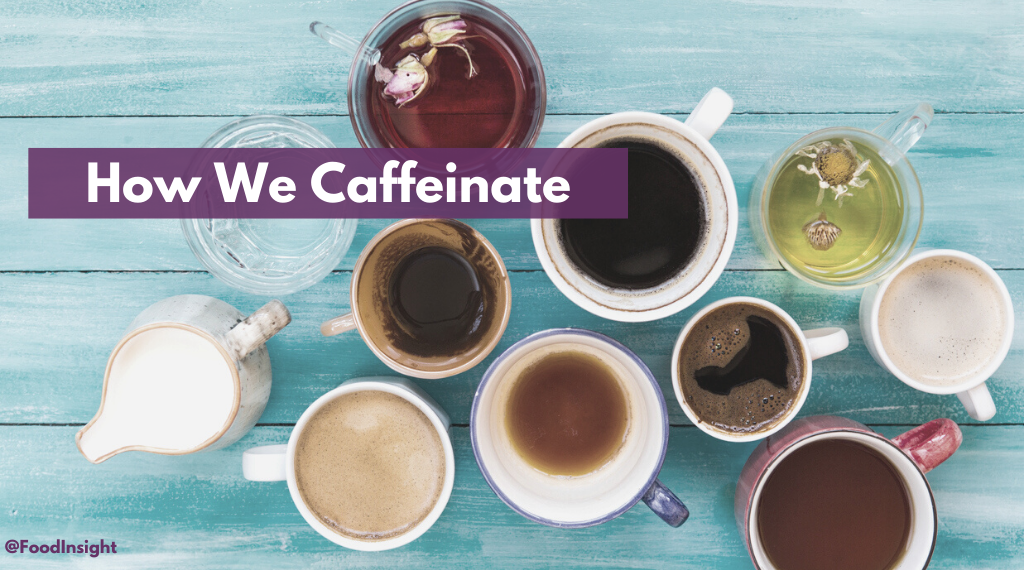September 29th was International Coffee Day, and I for one am here to celebrate. As a long-time coffee lover and current Seattleite, I find that one day doesn’t seem enough to pay homage to this delightful morning beverage. I can have my own mini celebration each morning as I push the plunger in my French press and savor that first sip. While coffee is my personal favorite, humans across the world choose to caffeinate in many different ways. Taste preferences, time of day, family structure, social cues and many other factors impact how we choose to energize ourselves each day.
Our morning (or afternoon) “cuppa” joe
The recent International Food Information Council (IFIC) Food and Health Survey asked consumers about their caffeine preferences, and one thing rings true in 2020—coffee is top of mind. Almost 70% of people surveyed chose coffee as their top caffeine preference, followed closely behind by soft drinks and tea. The survey also highlighted what time of day we most like to caffeinate. Unsurprisingly, people reach for that morning cup most often either first thing after waking up or alongside breakfast. Notably, men are more likely than woman to consume their coffee (or other beverage of choice) with breakfast in the morning. Many parents with young ones don’t all fall into that category of morning coffee-drinkers, though. Compared with those without young children, parents seek out caffeine more often in the afternoon—maybe as a nap–time reprieve. Parents are also more likely to mix it up and reach for multiple sources of caffeine throughout the day, including coffee but also tea, soft drinks, and more.
Some celebrate more than coffee
While coffee is the most popular means to caffeinate in the U.S., it’s not always the most popular in the world. In Scandinavian countries like Norway, Finland, and Denmark, coffee consumption is at its peak, where residents consume upwards of twenty-six pounds of coffee per capita each year. However, other parts of the world, even parts of the U.S., may prefer other beverages. Tea and soft drinks are next in line on Americans’ palates, but that’s not the end of the list. Unexpected or new sources of caffeine, such as energy shots, chocolate, and dietary supplements containing caffeine, are also growing in popularity.
It is important to note that the FDA “is warning consumers about dietary supplements consisting of pure or highly concentrated caffeine and recommends avoiding these products. In particular, the FDA is concerned about pure and highly concentrated caffeine, in powdered and liquid forms, sold in bulk containers and marketed directly to consumers.” See: FDA Warns Consumers About Pure and Highly Concentrated Caffeine, here.
For those who want to expand beyond their morning hot coffee, there’s plenty of exploring to do, but it’s always important to keep in mind how much caffeine you are consuming before diving into something new. If you’re a one-a-day morning cup of coffee person, switching over to an energy shot could double your caffeine consumption, and that may increase your chance of having negative side effects such as an upset stomach, feeling jittery, or headaches. While caffeine is safe, moderate consumption is 300–400 milligrams daily and can depend on your age, medical conditions and general sensitivity to caffeine. During pregnancy, the recommendation is even lower (no more than 200 milligrams), which means it’s even more important to monitor intake. Therefore, that switch from coffee to an energy shot could be impactful depending on these factors, but it also may have no effect at all if your daily consumption stays within that recommended range.
Why reach for that morning fuel?
Caffeine, and thus coffee, is not only safe in moderate amounts, but it may also have some added benefits. The benefits may be either or both mental and physical, including improved concentration and alertness, greater endurance, and delayed fatigue during exercise. It’s important to note that these improvements are not beyond a person’s already-existing capability. While a cup of coffee might make a runner last longer during a marathon, it cannot make the runner faster than they can already run. As much as we may like to believe it, coffee cannot give humans superpowers.
Drinks like coffee and tea can also be hydrating, despite the myth that they dehydrate the body. While caffeine itself stimulates fluid loss as a diuretic, the water in coffee has a greater impact on the beverage’s overall hydration status. Therefore, a cup of coffee before exercise can benefit you in multiple ways—providing hydration and giving a boost of energy to help you last throughout the workout.
One final cheers to coffee!
If coffee is your go-to, you aren’t alone. It’s the most popular caffeinated beverage for Americans, and it can be beneficial in many walks of life, from parenthood to marathon training. International Coffee Day celebrates this special hot beverage, but that doesn’t mean it’s the only time to celebrate. Savor the complex flavors of your morning joe as you prepare yourself for another day of work, parenting, or anything in between.
This article was written by Courtney Schupp, MPH, RD.

